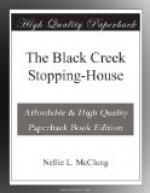While Mrs. Corbett gaily rattled on there was one man at her table who apparently took no notice of what she said.
He was a different type of man from all the others. Dark complexioned, with swarthy skin and compelling black eyes, he would be noticeable in any company. He was dressed in the well-cut clothes of a city man, and carried himself with a certain air of distinction.
Happening to notice the expression on his face, Mrs. Corbett suddenly changed the conversation, and during the remainder of the meal watched him closely with a puzzled and distrustful look.
When the men had gone that day and John Corbett came in to have his afternoon rest on the lounge in the kitchen, he found Maggie in a self-reproachful mood.
“Da,” she began, “the devil must have had a fine laugh to himself when he saw the Lord puttin’ a tongue in a woman’s head. Did ye hear me to-day, talking along about that purty young thing beyant, and Rance Belmont takin’ in every word of it? Sure and I never thought of him bein’ here until I noticed the look on that ugly mug of his, and mind you, Da, there’s people that call him good-lookin’ with that heavy jowl of his and the hair on him growin’ the wrong way on his head, and them black eyes of his the color of the dirt in the road. They do say he’s just got a bunch of money from the old country, and he’s cuttin’ a wide swath with it. If I’d kept me mouth shut he’d have gone on to Brandon and never knowed a word about there being a purty young thing near. But I watched him hitchin’ up, and didn’t he drive right over there; and I tell you, Da, he means no good.”
“Don’t worry, Maggie,” John Corbett said, soothingly. “He can’t pick her up and run off with her. Mrs. Fred’s no fool.”
“He’s a divil!” Maggie declared with conviction. “Mind you, Da, there ain’t many that can put the comaudher on me, but Rance Belmont done it once.”
Mr. Corbett looked up with interest and waited for her to speak.
“It was about the card-playin’. You know I’ve never allowed a card in me house since I had a house, and never intended to, but the last day Rance Belmont was here—that was away last spring, when you were away— he begins to play with one of the boys that was in for dinner. Right in there on the sewin’-machine in plain sight of all of us I saw them, and I wiped me hands and tied up me apron, and I walked in, and says I, ‘I’ll be obliged to you, Mr. Belmont, to put them by,’ and I looked at him, stiff as pork. ‘Why, certainly, Mrs. Corbett,’ says he, smilin’ at me as if I had said somethin’ pleasant. I felt a little bit ashamed, and went on to sort of explain about bein’ brought up in the Army and all that, and he talked so nice about the Army that you would have thought it was old Major Morris come back again from the dead, and pretty soon he had me talkin’ away to him and likin’ him; and says he, ’I was just going to show Jimmy here a funny trick that can be done with cards, but,’ says he, ’if Mrs. Corbett objects I wouldn’t offend her for the world!’ Now here’s the part that scares me, Da—me, Maggie Murphy, that hates cards like I do the divil; says I to him, ’Oh, go on, Mr. Belmont; I don’t mind at all!’ Now what do you think of that, Da?”




